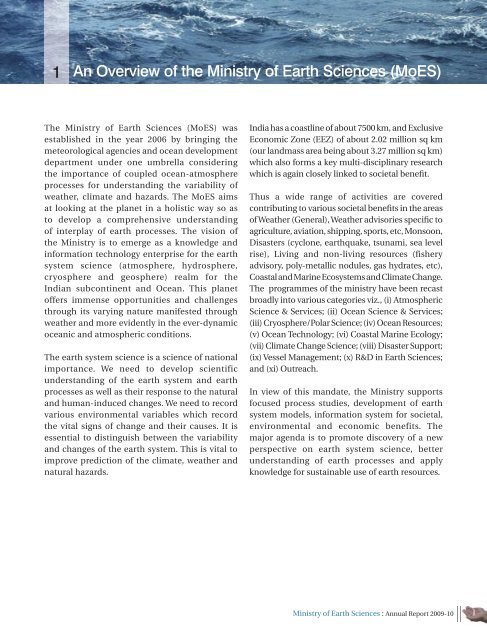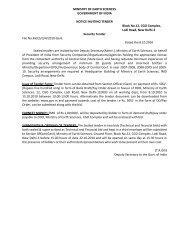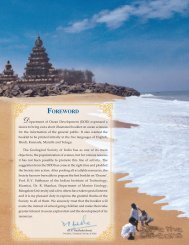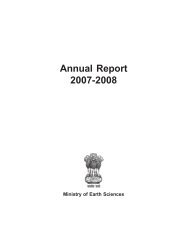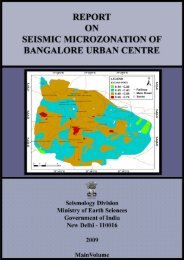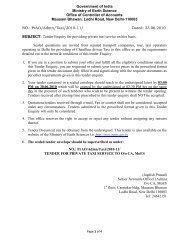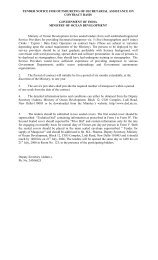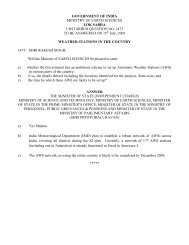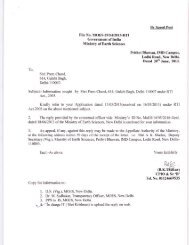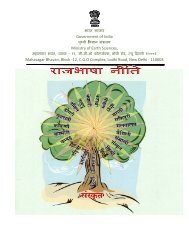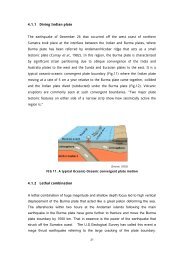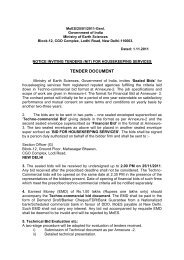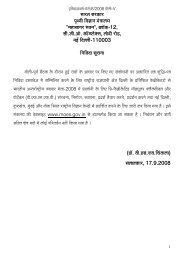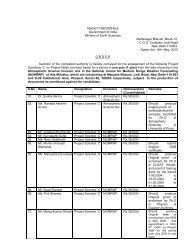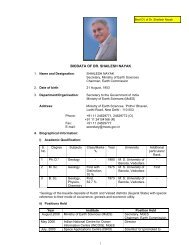Annual Report 2009-2010 - Ministry Of Earth Sciences
Annual Report 2009-2010 - Ministry Of Earth Sciences
Annual Report 2009-2010 - Ministry Of Earth Sciences
Create successful ePaper yourself
Turn your PDF publications into a flip-book with our unique Google optimized e-Paper software.
1<br />
An Overview of the <strong>Ministry</strong> of <strong>Earth</strong> <strong>Sciences</strong> (MoES)<br />
The <strong>Ministry</strong> of <strong>Earth</strong> <strong>Sciences</strong> (MoES) was<br />
established in the year 2006 by bringing the<br />
meteorological agencies and ocean development<br />
department under one umbrella considering<br />
the importance of coupled ocean-atmosphere<br />
processes for understanding the variability of<br />
weather, climate and hazards. The MoES aims<br />
at looking at the planet in a holistic way so as<br />
to develop a comprehensive understanding<br />
of interplay of earth processes. The vision of<br />
the <strong>Ministry</strong> is to emerge as a knowledge and<br />
information technology enterprise for the earth<br />
system science (atmosphere, hydrosphere,<br />
cryosphere and geosphere) realm for the<br />
Indian subcontinent and Ocean. This planet<br />
offers immense opportunities and challenges<br />
through its varying nature manifested through<br />
weather and more evidently in the ever-dynamic<br />
oceanic and atmospheric conditions.<br />
The earth system science is a science of national<br />
importance. We need to develop scientific<br />
understanding of the earth system and earth<br />
processes as well as their response to the natural<br />
and human-induced changes. We need to record<br />
various environmental variables which record<br />
the vital signs of change and their causes. It is<br />
essential to distinguish between the variability<br />
and changes of the earth system. This is vital to<br />
improve prediction of the climate, weather and<br />
natural hazards.<br />
India has a coastline of about 7500 km, and Exclusive<br />
Economic Zone (EEZ) of about 2.02 million sq km<br />
(our landmass area being about 3.27 million sq km)<br />
which also forms a key multi-disciplinary research<br />
which is again closely linked to societal benefit.<br />
Thus a wide range of activities are covered<br />
contributing to various societal benefits in the areas<br />
of Weather (General), Weather advisories specific to<br />
agriculture, aviation, shipping, sports, etc, Monsoon,<br />
Disasters (cyclone, earthquake, tsunami, sea level<br />
rise), Living and non-living resources (fishery<br />
advisory, poly-metallic nodules, gas hydrates, etc),<br />
Coastal and Marine Ecosystems and Climate Change.<br />
The programmes of the ministry have been recast<br />
broadly into various categories viz., (i) Atmospheric<br />
Science & Services; (ii) Ocean Science & Services;<br />
(iii) Cryosphere/Polar Science; (iv) Ocean Resources;<br />
(v) Ocean Technology; (vi) Coastal Marine Ecology;<br />
(vii) Climate Change Science; (viii) Disaster Support;<br />
(ix) Vessel Management; (x) R&D in <strong>Earth</strong> <strong>Sciences</strong>;<br />
and (xi) Outreach.<br />
In view of this mandate, the <strong>Ministry</strong> supports<br />
focused process studies, development of earth<br />
system models, information system for societal,<br />
environmental and economic benefits. The<br />
major agenda is to promote discovery of a new<br />
perspective on earth system science, better<br />
understanding of earth processes and apply<br />
knowledge for sustainable use of earth resources.<br />
<strong>Ministry</strong> of <strong>Earth</strong> <strong>Sciences</strong> : <strong>Annual</strong> <strong>Report</strong> <strong>2009</strong>-10<br />
1


